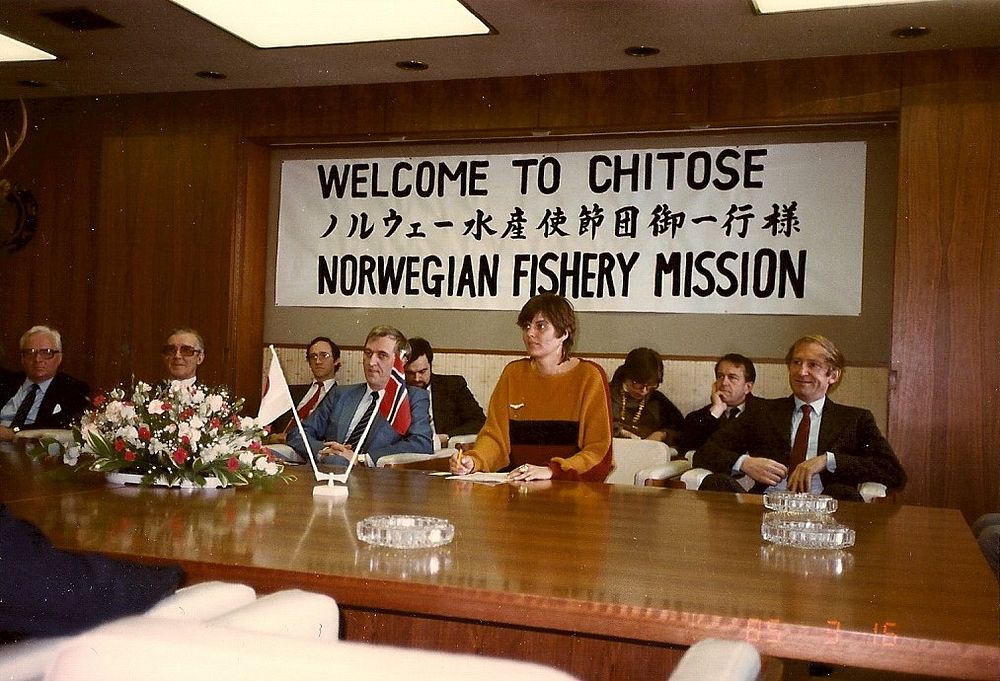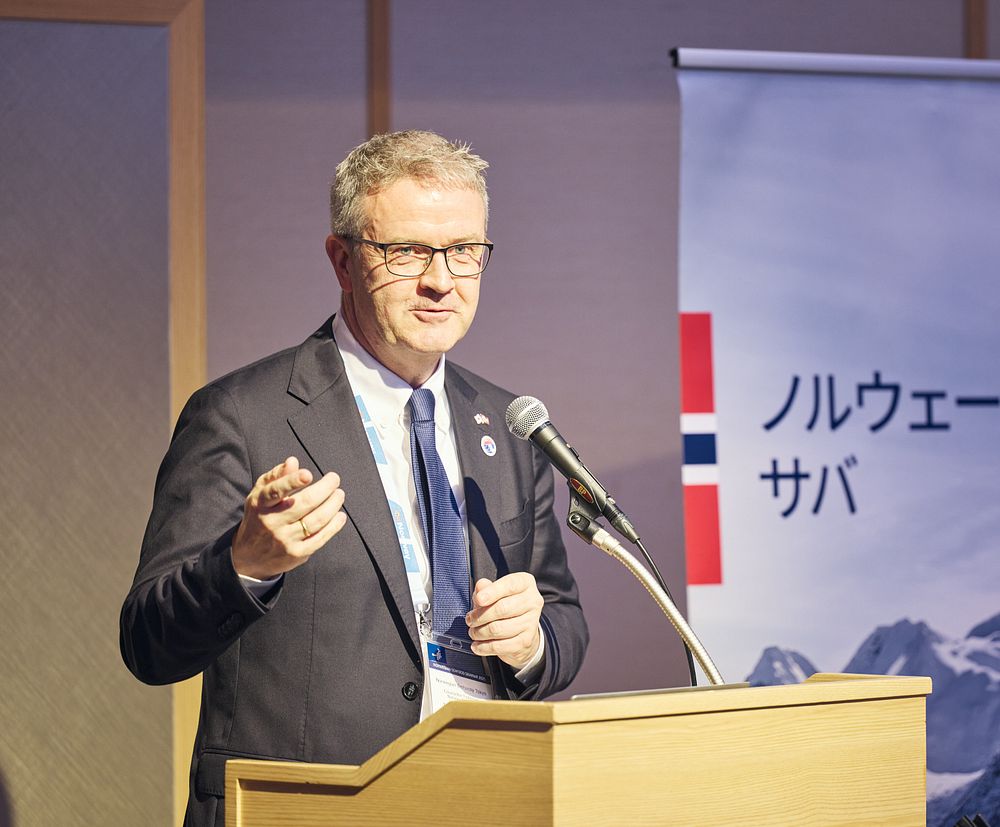
Press release -
Norwegian salmon continues to lead global sushi category 40 years on from its introduction to Japan
As International Sushi Day approaches, the Norwegian Seafood Council looks back on Project Japan – the initiative that introduced raw salmon from Norway to the global sushi menu.
This year marks the 40th anniversary of the introduction of salmon sushi to Japan, thanks to a group of determined Norwegians intent on persuading the Japanese that high-quality raw salmon from Norway could complement their national dish.
With International Sushi Day approaching on 18th of June, the Norwegian Seafood Council is reflecting on how this cross-cultural culinary collaboration helped spark a global sushi phenomenon.
Now globally recognised for both its nutritional value and taste, salmon sushi has played a vital role in establishing a global preference for raw salmon. According to estimates from the Norwegian Seafood Council, around 30% of Norwegian salmon ends up as sushi and is consumed raw.
The global rise of salmon sushi
In 1985, a delegation of Norwegians travelled to Tokyo with the intent to sell fish to the Japanese. The project developed into a mission to convince the Japanese that raw, Norwegian salmon could be incorporated into sushi dishes. Today the popularity and reach of sushi globally is closely interlinked with the pink, popular fish from Norway – and vice versa.
While sushi is a traditional Japanese dish with over 500 years of history, the use of raw salmon in the cuisine is a more recent addition introduced by Norway in the 1980s.

Bjørn Eirik Olsen, who was involved in Project Japan during the 1980s as Head of Market Analysis and Strategy, remembers those early efforts to promote Norwegian salmon. Reflecting on the global rise of both sushi and Norwegian salmon today, he says:
“I never dreamed that salmon as a sushi-topping would be such a huge trend all across the world.”
This year the Norwegian Seafood Council is shining a light on the shared culinary history of Japan and Norway, highlighting the 40-year anniversary of Project Japan and the introduction of salmon sushi. Combining the two countries’ shared love for quality food and distinctive cuisine, today Norwegian salmon sushi is an international staple.
“Norwegian salmon wouldn’t be the global favourite it is today without the help of sushi. This year we want to celebrate the shared history between Norway and Japan, as well as highlight 40 years of salmon sushi,” says CEO of the Norwegian Seafood Council, Christian Chramer.

Project Japan: a decade in the making
Demand for sushi in Japan in the 1980s outweighed the supply of tuna, which at the time was the most popular sushi ingredient. As Japan struggled with its tuna stocks, Norway saw an opportunity to introduce salmon to the market. This led to the Project Japan initiative, led by former Minister of Fisheries Thor Listau.
Project Japan experimented with salmon in sushi dishes, serving it to importers and restaurants, and at dinner parties at the Norwegian Embassy in Tokyo. The dedicated team also launched a salmon campaign with the few resources they had available.
While the initiative was not immediately successful, the long-term impact is clear: in 1980, Norway exported 2 tonnes of salmon to Japan; 20 years later it was exporting more than 45,000 tonnes to the country annually.
Following 10 years of continued relationship-building, trust and innovation, Norway successfully boosted salmon consumption in Japan, which in turn led to Norwegian salmon's popularity worldwide.

Japanese cuisine introduced raw salmon to the world
Now, Norwegian salmon is not only the most popular fish among global consumers, but also one of the world's most popular sushi fish. This is largely thanks to the Japanese cuisine that introduced raw salmon to the world.
“Norway played a crucial role in introducing salmon as an ingredient in Japanese sushi during the 1980s and 1990s. Through Project Japan’s efforts, Norwegian salmon became a preferred choice in Japanese cuisine, initially as part of a trade and relationship-building initiative,” says Johan Kvalheim, Country Director to Japan.
“Then, Japan brought Norwegian salmon to the world, establishing it as a staple of international sushi culture and making it popular globally. This partnership between Norway’s high-quality salmon production and Japan’s refined culinary traditions helped shape one of today’s most celebrated food trends," Kvalheim states.

Raw salmon: global takeover
Introducing Norwegian salmon through sushi has paved the way for Norway’s salmon exports and the popularity of the fish. Using raw, Norwegian salmon in sushi has also spearheaded the use of salmon in globally recognised dishes such as sashimi and poke.
Earlier NSC research* found that in 17 out of 20 countries studied, salmon is the most preferred sushi topping.
In addition, Norway accounts for approximately 53% of the global salmon market, exporting salmon to 113 countries.
A recent NSC study** looking at Japanese eating habits when dining out, shows that raw salmon is the number one choice of serve.
As many as 59% of consumers say they choose to eat salmon raw, either in sushi, sashimi or a poke bowl – often referred to as ‘deconstructed sushi’. When compared with the second-most-popular preferred preparation – seared and browned salmon – only 14% say they have eaten the fish prepared this way.
Forty years after the introduction of salmon sushi, these numbers show great promise for the future of salmon and the culinary traditions that continue to shape the consumption of this fish.
---
* NSC Annual Consumer Survey 2020
** NSC Japan Deep Dive 2023
Related links
Topics
Categories
The Norwegian Seafood Council works with the Norwegian fisheries and aquaculture industries to develop markets for Norwegian seafood through local market intelligence, market development and reputational risk management. The Seafood Council is headquartered in Tromsø and maintains local representatives in twelve of Norway's most important international markets. The Norwegian seafood industry finances the activities of the Norwegian Seafood Council via a tariff on all Norwegian seafood exports.
The Norwegian Seafood Council is a public company owned by the Ministry of Trade, Industry and Fisheries.








